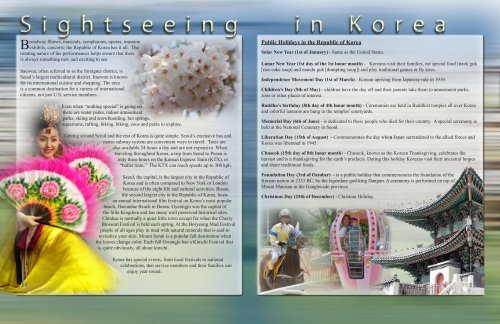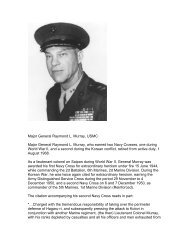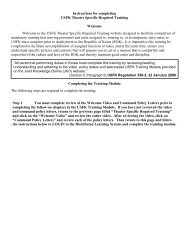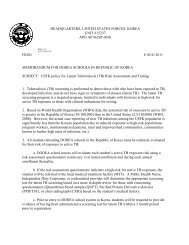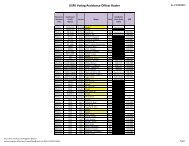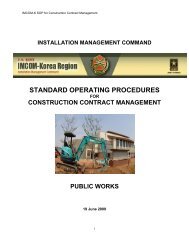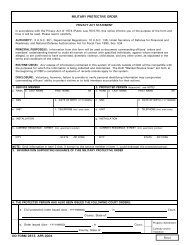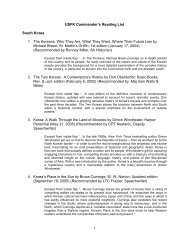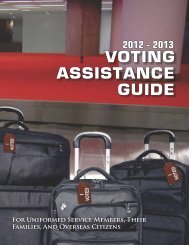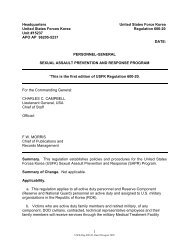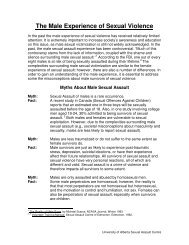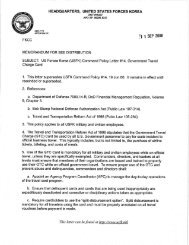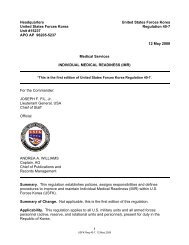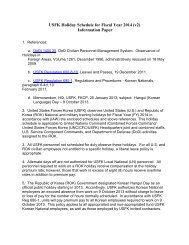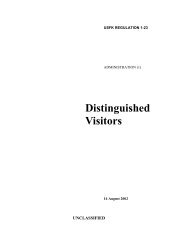You also want an ePaper? Increase the reach of your titles
YUMPU automatically turns print PDFs into web optimized ePapers that Google loves.
Broadway Shows, musicals, symphonies, operas, museum<br />
exhibits, concerts; the Republic of <strong>Korea</strong> has it all. The<br />
rotating nature of the performances helps ensure that there<br />
is always something new and exciting to see.<br />
Itaewon, often referred to as the foreigner district, is<br />
Seoul’s largest multicultural district. Itaewon is known<br />
for its international cuisine and shopping. The area<br />
is a common destination for a variety of international<br />
citizens, not just U.S. service members.<br />
Even when “nothing special” is going on<br />
there are water parks, indoor amusement<br />
parks, skiing and snowboarding, hot springs,<br />
aquariums, rafting, hiking, biking, zoos and parks to explore.<br />
Getting around Seoul and the rest of <strong>Korea</strong> is quite simple. Seoul’s extensive bus and<br />
metro subway system are convenient ways to travel. Taxis are<br />
also available 24 hours a day and are not expensive. When<br />
traveling throughout <strong>Korea</strong>, a trip from Seoul to Pusan is<br />
only three hours on the <strong>Korea</strong>n Express Train (KTX), or<br />
“bullet train.” The KTX can reach speeds up to 300 kph.<br />
Seoul, the capital, is the largest city in the Republic of<br />
<strong>Korea</strong> and is often compared to <strong>New</strong> York or London<br />
because of the night life and cultural activities. Busan,<br />
the second largest city in the Republic of <strong>Korea</strong>, hosts<br />
an annual international film festival on <strong>Korea</strong>’s most popular<br />
beach, Haeundae Beach in Busan. Gyeongju was the capital of<br />
the Silla Kingdom and has many well preserved historical sites.<br />
Chinhae is normally a quiet little town except for when the Cherry<br />
Blossom Festival is held each spring. At the Boryeong Mud Festival<br />
people of all ages play in mud with natural minerals that is said to<br />
revitalize your skin. Mount Sorak is a popular fall destination when<br />
the leaves change color. Each fall Gwangju has a Kimchi Festival that<br />
is, quite obviously, all about kimchi.<br />
Public Holidays in the Republic of <strong>Korea</strong><br />
Solar <strong>New</strong> Year (1st of January) - Same as the United States.<br />
Lunar <strong>New</strong> Year (1st day of the 1st lunar month) - <strong>Korea</strong>ns visit their families, eat special food (tteok guk<br />
[rice cake soup] and mandu guk [dumpling soup]) and play traditional games or fly kites.<br />
Independence Movement Day (1st of March) - <strong>Korea</strong>n uprising from Japanese rule in 1919.<br />
Children’s Day (5th of May) - children have the day off and their parents take them to amusement parks,<br />
zoos or other places of interest.<br />
Buddha’s birthday (8th day of 4th lunar month) - Ceremonies are held in Buddhist temples all over <strong>Korea</strong><br />
and colorful lanterns are hung in the temples’ courtyards.<br />
Memorial Day (6th of June) - is dedicated to those people who died for their country. A special ceremony is<br />
held at the National Cemetery in Seoul.<br />
Liberation Day (15th of August) - Commemorates the day when Japan surrendered to the allied forces and<br />
<strong>Korea</strong> was liberated in 1945.<br />
Chuseok (15th day of 8th lunar month) - Chuseok, known as the <strong>Korea</strong>n Thanksgiving, celebrates the<br />
harvest and is a thanksgiving for the earth’s products. During this holiday <strong>Korea</strong>ns visit their ancestral homes<br />
and share traditional foods.<br />
Foundation Day (3rd of October) - is a public holiday that commemorates the foundation of the<br />
<strong>Korea</strong>n nation in 2333 BC, by the legendary god-king Dangun. A ceremony is performed on top of<br />
Mount Manisan in the Ganghwado province.<br />
Christmas Day (25th of December) - Christian Holiday.<br />
<strong>Korea</strong> has special events, from local festivals to national<br />
celebrations, that service members and their families can<br />
enjoy year round.


